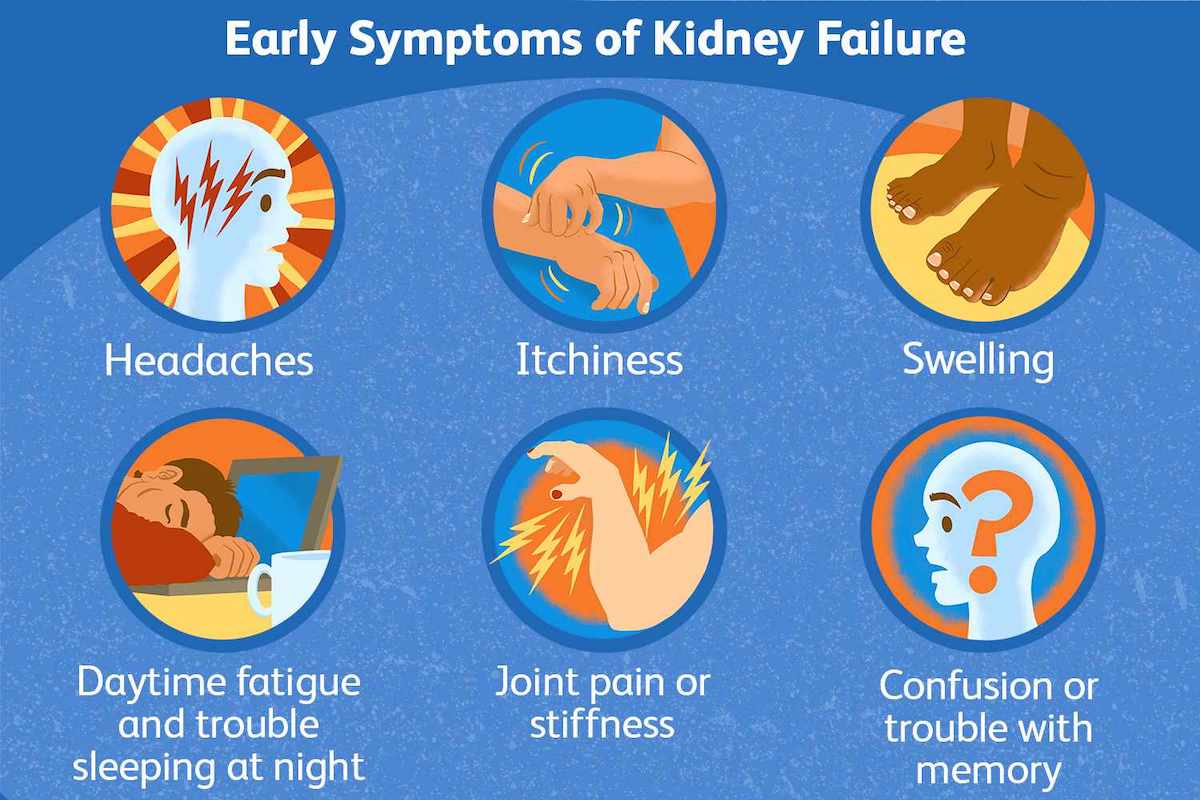If kidney failure goes undiagnosed and untreated, it can lead to various complications, ranging from severe to less critical. Life-threatening issues include a dangerous build-up of waste in the body, worsening high blood pressure leading to heart problems, anemia which makes you feel very weak, and bone problems resulting in weak bones. Less severe complications encompass swelling in legs, ankles, and feet due to fluid retention, difficulty in sleeping, and problems with sexual function or fertility. Early detection and treatment of kidney failure are essential to prevent these complications and maintain overall health.

Symptoms of Kindey Failure
Recognizing kidney failure can often be done by noticing two common symptoms: swelling and fatigue. Swelling, especially in the legs, ankles, or feet, occurs because the kidneys are unable to effectively remove extra fluid from the body. Additionally, feeling very tired is a frequent symptom, as the body struggles to eliminate waste properly, leading to a sense of exhaustion. These symptoms can be key indicators of kidney failure and should prompt a visit to the doctor for further evaluation. Other symptoms to look out for include:
- Changes in how often you need to use the bathroom.
- Trouble sleeping.
- Decreased appetite.
- Muscle cramps.
- Dry, itchy skin.
- Puffiness around your eyes, especially in the morning.
How Is it Diagnosed?
Diagnosing kidney failure involves a series of tests conducted by doctors to assess kidney function. Blood tests, such as those measuring creatinine levels, are used to determine how effectively the kidneys are filtering waste from the blood. Urine tests are also important, as they can detect the presence of protein or blood, indicating kidney damage.
Additionally, imaging tests like ultrasound or CT scans provide a visual assessment of the kidneys, revealing any physical abnormalities. In some cases, a kidney biopsy might be performed, where a small sample of kidney tissue is examined under a microscope to identify the specific cause of the kidney issues. Together, these tests give doctors a comprehensive understanding of the kidney’s condition and guide them in planning appropriate treatment.
Treatment Options of Kindey Failure
Treating kidney failure often involves dialysis or a kidney transplant as the primary methods. Dialysis is a procedure that takes over the function of the kidneys by removing waste, excess salt, and water from the body, while also maintaining a safe balance of certain chemicals in the blood and helping to control blood pressure. A kidney transplant, on the other hand, involves replacing the failed kidneys with a healthy one from a donor, allowing the new kidney to perform the functions the damaged kidneys can no longer manage. Other treatment options include:
-
- Changes in diet to reduce waste in the blood.
- Medications to treat symptoms like swelling and high blood pressure.
- Managing underlying conditions, such as diabetes, that can contribute to kidney failure.
It’s important to do a lot of research on this condition. You can do this by talking to your professional healthcare provider, as well as through online research. We want to help you along, so start your search here:

